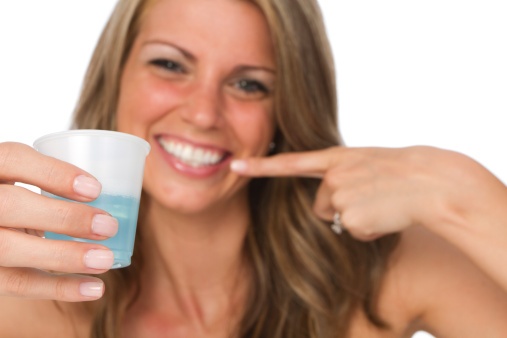By Erica Laceria on Aug 7, 2015 @ 04:47 PM
When you walk down the oral care aisle at the pharmacy, are you confused by the many choices of mouth wash? The many brands, colors, and claims make it easy to give up, or to just pick one and hurry to check-out.
There is a difference among those bottles. The reason for using a mouthwash can determine which one you should buy. We’ve narrowed it down to three major categories you should consider when purchasing your mouthwash: Fluoride, Therapeutic and Cosmetic.
Ready to learn more? Here is your Guide to the Most Effective Mouth Washes:
1. Fluoride:
- Sodium fluoride works by hardening the tooth surface, making it more resistant to decay.
- Fluoride is the gold standard for cavity prevention. Using a mouth wash containing fluoride can reach spots that other products might miss.
- The best time to use a fluoride rinse is after brushing and flossing, before you go to bed – you shouldn’t eat or drink for thirty minutes after rinsing.
- Fluoride rinses are not recommended for children under six years old, because they may swallow the liquid.
- Ask your dentist about using a fluoride mouth wash. Toothpaste and tap water contain fluoride, which might be sufficient for you.
2. Therapeutic:
- Therapeutic mouth washes have a specific purpose. Some are available at your pharmacy, or may be prescribed by your dentist.
- It helps reduce tooth plaque by fighting the bacteria that are present in plaque. Plaque bacteria release toxins which can damage the gums.
- It can also help prevent and relieve gingivitis (inflammation of the gums) which can lead to serious gum disease, called periodontitis.
- Look for a label that says: "antimicrobial" or "antibacterial."
- Chlorhexidine gluconate is an antiseptic mouth wash, often used before and after dental procedures to prevent infection and soothe the mouth. Prescribed by a dentist, this rinse is used for six months or less.
- Always follow directions on the label, or as instructed by your dentist.
- Therapeutic mouth washes may also help with bad breath, because they kill some of the bacteria.
3. Cosmetic:
- The main purpose of cosmetic mouthwashes is to reduce bad breath (halitosis).
- The effects of cosmetic mouth washes are temporary. They may kill some odor-causing bacteria, but do not eliminate the cause.
- Aside from removing some particles during swishing, there are no real long-term benefits to cosmetic rinses.
Make sure that each of these categories are in check with your standards when choosing a mouthwash for yourself. That being said, we’ll leave you with two final reminders:
- No mouth wash can substitute for proper brushing and flossing.
- A mouth wash can't be effective unless it's used regularly.
With proper oral care and good information, you can keep your smile bright and your mouth healthy!





comments